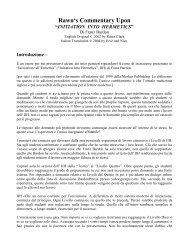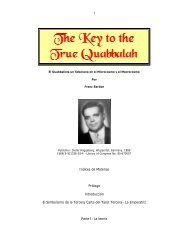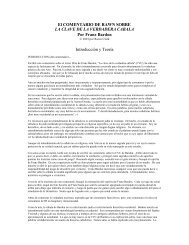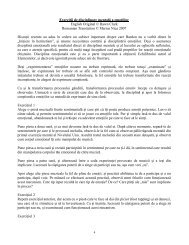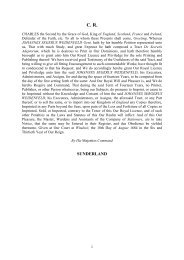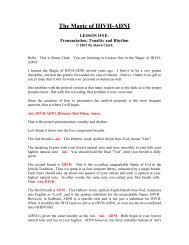Hermetic Philosophy and Alchemy - A Bardon Companion
Hermetic Philosophy and Alchemy - A Bardon Companion
Hermetic Philosophy and Alchemy - A Bardon Companion
Create successful ePaper yourself
Turn your PDF publications into a flip-book with our unique Google optimized e-Paper software.
"If you consider how the partes of the werkes<br />
Be out of order set by the old clerkes,<br />
As I said before, the master of this arte,<br />
Every <strong>and</strong> each of them disclosed but a parte;<br />
Wherefore tho’ ye perceived themas ye woulde,<br />
Yet ye cannot order or joine them as ye shoulde" (Norton, 107).<br />
"For is not our art cabalistic", asks Artephius, "<strong>and</strong> full of mysteries? And you, fool, believe we teach<br />
the secret of secrets openly, <strong>and</strong> underst<strong>and</strong> our words according to the letter; be assured, we are not<br />
envious, but he that takes the philosophers’ saying according to the outward sense <strong>and</strong> signification<br />
has already lost the clue to Ariadne, <strong>and</strong> w<strong>and</strong>ers up <strong>and</strong> down the labyrinth, <strong>and</strong> it would be of the<br />
same benefit to him as if he had thrown his money into the sea" (108). And Sendivogius, to the same<br />
effect in the Preface of the Twelve Treatises, --- "I would", says he, "have the c<strong>and</strong>id reader be<br />
admonished that he underst<strong>and</strong> my writings, not so much from the outside of my words as from the<br />
possibility of nature; let him consider that this Art is for the wise, not for the ignorant; <strong>and</strong> that the<br />
sense of the philosophers is of another nature than to be understood by vaporizing Thrasoes, or the<br />
letter learned scoffers, or vicious, against their own consciences; or ignorant montebanks, who, most<br />
unworthily defaming the most commendable art of <strong>Alchemy</strong>, have with their Whites <strong>and</strong> Reds<br />
deceived almost the whole world" (109). And agin, in the Epilogue, --- "All things indeed", says the<br />
adept, "might have been comprehended in a few lines; but we are willing to guide into the knowledge<br />
of nature indirectly, by reasons <strong>and</strong> examples: that thou may knowest what the thing truly is thou<br />
shouldst seek after, also that thou might have nature, her light <strong>and</strong> shadow, discovered to thee. Be not<br />
displeased if thou meetest sometimes with contradictions in my treatises, it being the custom of<br />
philosophers to use them; thou hast need of them: if thou underst<strong>and</strong>est them, thou shalt not find a rose<br />
without prickles" (110).<br />
"Each artist striving yt howtoconceal<br />
Lest wretched caitiffs shulde the treasure steal.<br />
Nor villains shulde their vyllanyes maintain<br />
By this rare art; which danger they to heal<br />
In horrid metaphors veiled are an art most plain,<br />
Lest each fool knowing yt shulde yt when known disdayne" (Ripley, 111).<br />
And Roger Bacon advises, therefore, to leave off experiments until the ground of wisdom is properly<br />
conceived. --- "And though I say, take this, <strong>and</strong> this, believe me not but operate according to the blood;<br />
i.e., according to the underst<strong>and</strong>ing, <strong>and</strong> so of all; leave off experiments, apprehend my meaning, <strong>and</strong><br />
you will find, believe me, being a lighted c<strong>and</strong>le" (112). And Basil Valentine <strong>and</strong> Eiranaeus, <strong>and</strong> most<br />
adepts in short, warn their readers against running into the practice upon vague premises, <strong>and</strong> before<br />
they have attained to a full underst<strong>and</strong>ing of the matter to be taken in h<strong>and</strong>; yet, notwithst<strong>and</strong>ing all<br />
their injunctions, many seekers, <strong>and</strong> faithful ones too, have been led astray: Geber’s receipts, Basil’s<br />
<strong>and</strong> Glauber’s, though at variance with all common-sense probability, have been the means of<br />
surrounding many a literal soul with stills, coals, <strong>and</strong> furnaces, in hope by such lifeless instruments to<br />
sublime the Spirit of Nature; or by salt, sulfur <strong>and</strong> mercury, or the three combined with antimony, to<br />
extract the Form of gold. But they who have thus fallen to practice, without the true Light or heeding<br />
their injunctions, had no right to charge their error on the adepts, the disappointment <strong>and</strong> misery of<br />
those fanatical chemists having been attributable to their own misunderst<strong>and</strong>ing bias, <strong>and</strong> more<br />
frequently owing to the deceit of sophists than to the genuine tradition of <strong>Hermetic</strong> science.<br />
Since difficulties however are apparent, <strong>and</strong> the pretenders to the Art were in latter times far more<br />
numerous than the true adepts, <strong>and</strong> the literature has suffered in consequence grievous disgrace <strong>and</strong><br />
spoliation, it is not surprising that the public, having been so long <strong>and</strong> grossly deluded, should at<br />
length have shut out <strong>Alchemy</strong> from amongst its credenda. If there was no desire to search deeper, it<br />
was wisely done, <strong>and</strong> checked the raging of a sore distemper. But that many have fallen into error <strong>and</strong><br />
suffered, or others proved deceivers, or that the world has chosen to disbelieve, are no proofs in


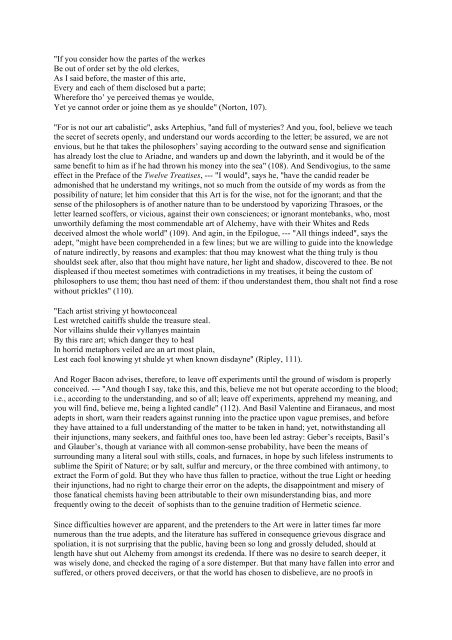
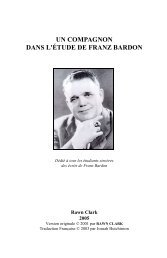
![Magie de YHVH-ADNY et Archeus[1]](https://img.yumpu.com/16926522/1/190x245/magie-de-yhvh-adny-et-archeus1.jpg?quality=85)
